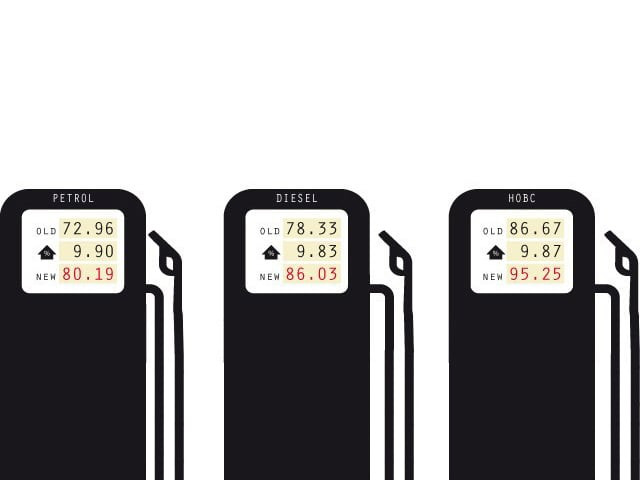Oil price hike: Role of opposition and media
Pakistan depends solely on imported petrol, there is not much that can be done about passing this increase in prices.

The MQM has also said that it rejects the oil price increase and has given the government three days to withdraw it, after which it will announce what line of action is to be taken. The Pakistan Tehreek-i-Insaf and the Jamaat-i-Islami have threatened to do this as well. None of them, however, has suggested any alternative course of action for the government.
Now, coming to arguments based on economics, the fact of the matter is that the international price of oil has substantially increased in recent months and, since Pakistan depends solely on imported petrol, there is not much that can be done about passing this increase on to consumers, unless the government pays for the difference — which, in effect, is a subsidy. This however, adds to government expenditure and is one reason why the federal government’s budget deficit is spiralling out of control, well above the 4.7 per cent stipulated by its foreign multilateral donors. A budget deficit is usually financed by government borrowing from the central bank which, in other words, means printing more money and that in turn leads to inflation. So critics who defend their call to the government to not increase petrol prices and who support that by saying that this will keep inflation under control, fail to see that subsidies, especially those that are across the board and do not target the poor specifically, are an undue burden on the federal budget and have an inflationary impact.
Again, for the critics it should be pointed out that the amount given in subsidy is not small by any yardstick. In the last five years alone, this subsidy has cost over Rs412 billion — last year the figure was Rs146.5 billion. In fact, even after raising petrol prices from March 1 by 9-10 per cent, the government will still be subsidising oil consumption by around Rs5 billion a month.
This is precisely why political parties, especially those in the opposition, need to exhibit some practical thinking and pragmatism on this issue. Taking a populist stance may win approval from a largely uninformed — or disinformed — public but it will not resolve anything, and will certainly do nothing for the economic crisis that Pakistan currently finds itself in. In fact, if the political parties and media are keen that the general public be saved from this ‘petrol bomb’, then pressure should be brought to bear on resolving issues such as circular debt; widening the tax net; implementing the RGST; and the matter of extra spending requests to the tune of Rs45 billion made by the armed forces during this fiscal year.
Some so-called experts who think the removal of the government in tandem with hanging Raymond Davis and arresting Americans suspected of being Blackwater agents will usher in a utopia of cheap oil and full employment should understand that hyperinflation will simply throw everything connected with the state out of joint. Getting rid of the PPP government will become a meaningless exercise when the state itself starts crumbing with all public amenities shut down and law and order playing to the advantage of al Qaeda.
Published in The Express Tribune, March 2nd, 2011.















COMMENTS
Comments are moderated and generally will be posted if they are on-topic and not abusive.
For more information, please see our Comments FAQ